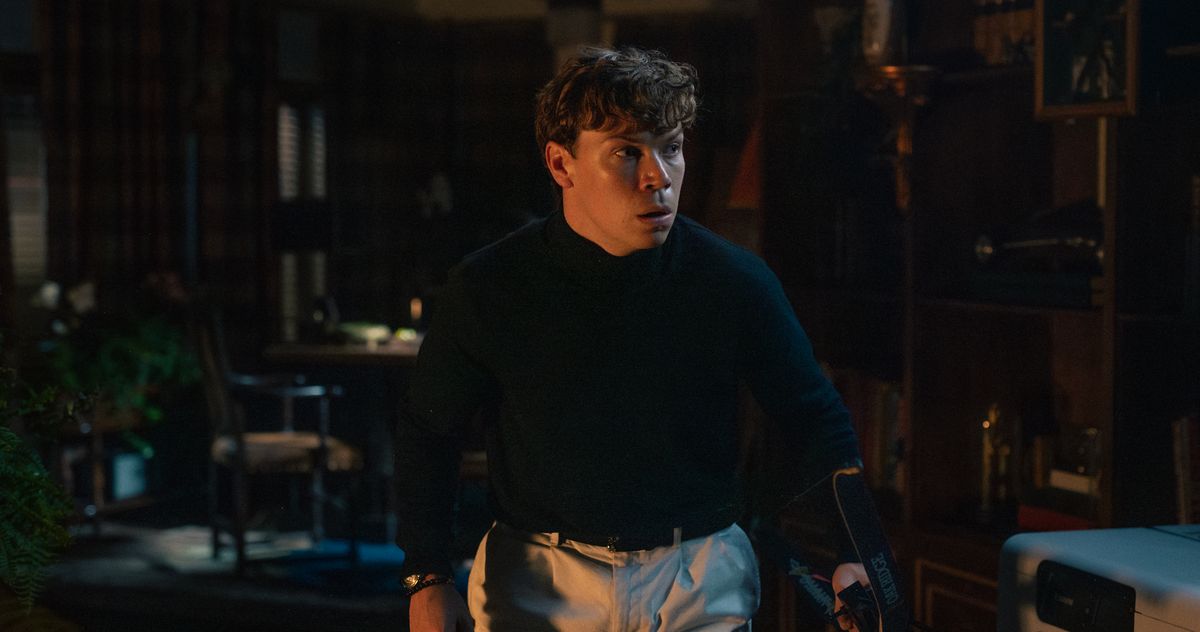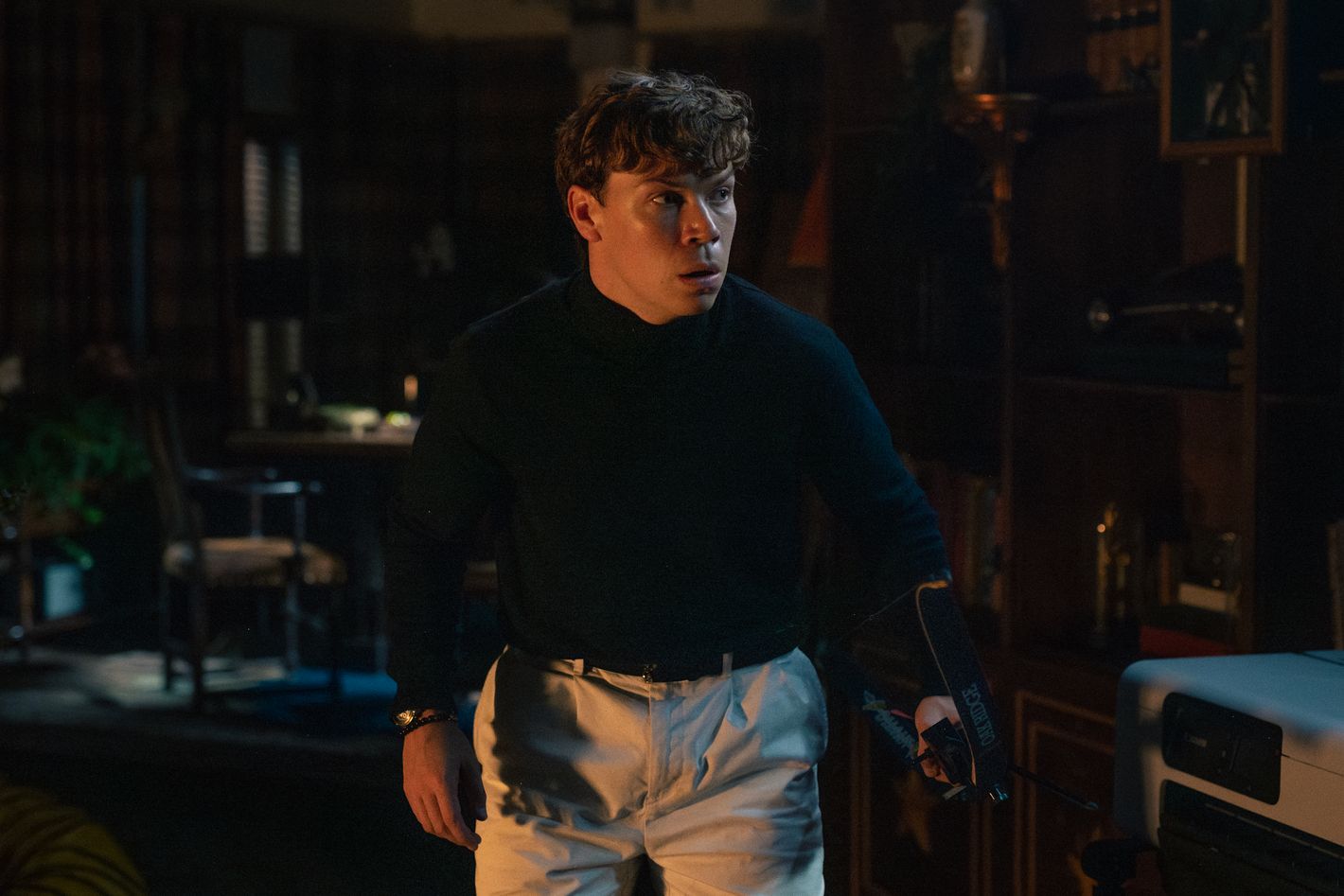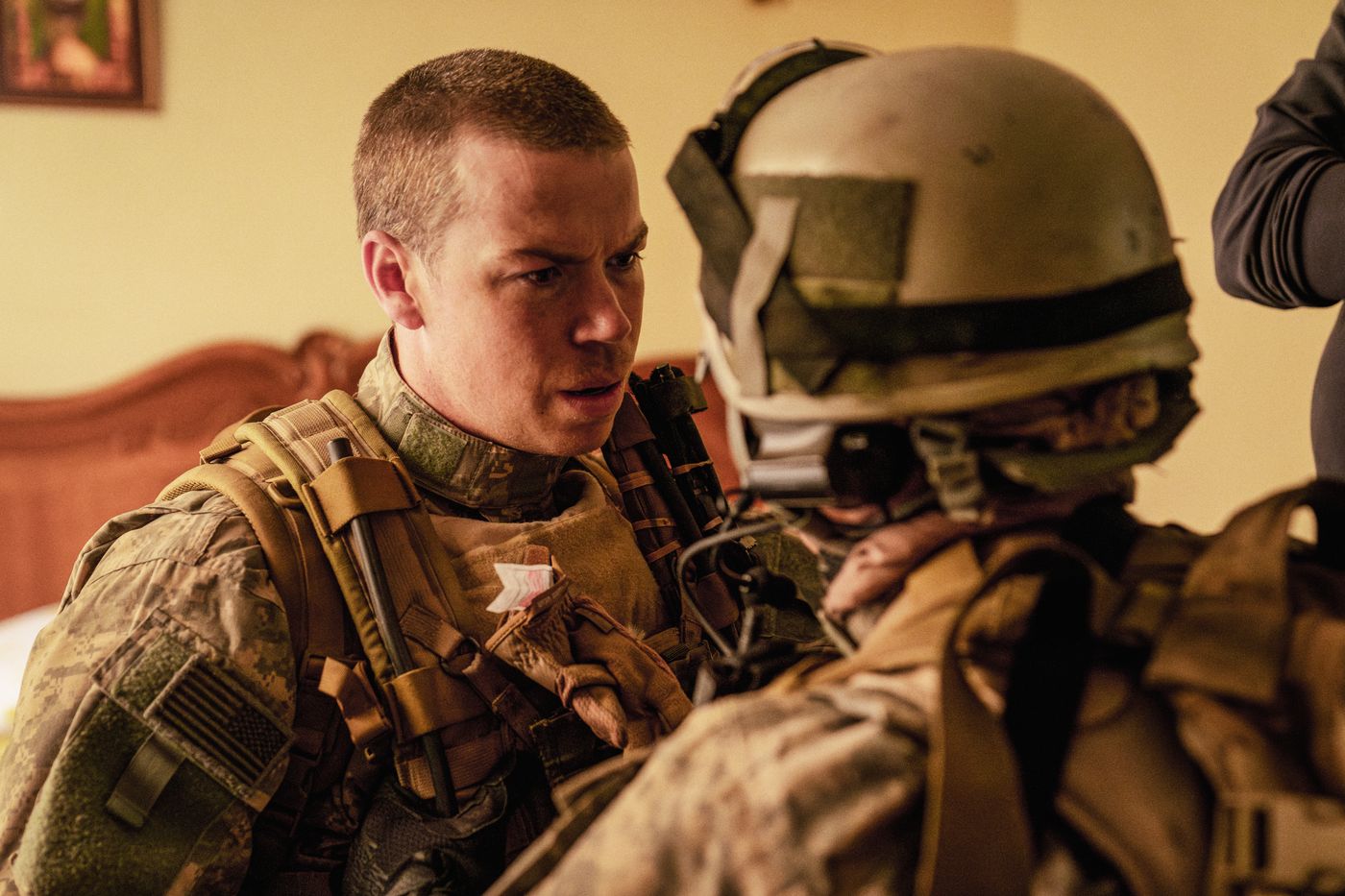Will Poulter on the Two Poles of His Spring A24 Roles
Death of a Unicorn and Warfare star Will Poulter on his twunky one-two punch — sweaty military fatigues here, pleated white shorts there.


Will Poulter is currently pulling off a very twunky one-two punch — sweaty military fatigues here, pleated white shorts there. He stars in a pair of polar-opposite movies opening two weeks apart, playing a Navy SEAL officer leading an Iraq War mission in Warfare and a reckless blue blood helping his parents (Richard E. Grant and Téa Leoni) plunder unicorns’ healing powers in Death of a Unicorn. The former, co-directed by Alex Garland and Ray Mendoza, is a tense thriller that turns the final 20 minutes of Civil War into a feature-length set piece in the Middle East, and the latter, directed by Resurrection producer Alex Scharfman, is a giddy eat-the-rich satire featuring enormous puppets. Poulter is the MVP of both. (He’ll also romance Jacob Elordi in On Swift Horses later in April.)
In person, the 32-year-old Brit is warmer and more unassuming than many of the characters he portrays, like his inattentive fuckboy in Midsommar, his intensely committed chef in The Bear, and his doltish warrior in Guardians of the Galaxy Vol. 3. He certainly doesn’t exhibit the excitable narcissism of Death of a Unicorn’s Shepard Leopold, who snorts purple unicorn powder like it’s cocaine and justifies his family’s crimes against nature as a “moral imperative.” He seems more like Daddy, the nickname his Warfare co-stars gave him because he was so responsible and productive while they bunked together. Last month, I sat down with Poulter at South by Southwest, where Unicorn premiered, to discuss the two poles he’s showcasing this spring.
It’s an actor’s dream to be able to be as ridiculous and uninhibited as you are in Death of a Unicorn, right?
In the context of a comedy, it’s kind of everything you hope for. Téa and Richard and I have discussed this idea: Within the Leopold family, you have the opportunity to do away with self-awareness. Being the worst version of these characters was really quite freeing. A lot of what I did was also informed naturally by just being around two incredibly experienced comedic actors and picking up on the cues that my very disappointed mum and dad were giving me.
Do you have an example of that?
It’s the stuff where Richard would be holding court as the patriarch and then Téa as Belinda would be gaslighting people and trying to convince people that the Leopold way, which is characterized by total self-interest, is the way to go. They veil it as a faux-philanthropic endeavor or a kind of performative activism. Their reaction to me always being a nuisance and adding no value was helpful in terms of understanding what Shep was struggling with and why he was constantly trying to appear worthy. He’s awful to anyone outside of that family framework.
Alex Scharfman has said he used the Sackler family as loose inspiration for the Leopolds. Is that something you exploited as well?
I think when you’re talking about an ultrarich, self-invested, and tyrannical business-minded family unit, yes, the Sacklers definitely come to mind. And there are a lot of hyperprivileged people who I think are deficient in empathy for other people’s experiences in the way that the Leopolds are.
What do you think Shep’s life looks like outside of this movie? Does he have any friends?
The thing Alex and I spoke about with Shep is the stuff that starts to make you almost feel bad for him were he not such an idiot with such massive privilege. This is not to absolve him of anything, but fundamentally he’s looking for approval from his parents. There’s a very humane experience for a lot of people. I think the only friends Shep potentially has are people who were taking advantage of him. Also, his relationship to his mom is so unhealthy. He’s definitely got some severe attachment anxiety. He can’t really make it in the outside world.
The unicorns are puppets, right? Not just CGI?
It’s a blend of the two, but yeah, the puppets were unbelievable. It’s never a tennis ball on the end of a stick. We were looking at these incredible puppets that also came with movement from the puppeteers who brought them to life in front of us.
[Warning: The next three questions spoil the end of Death of a Unicorn.]
What’s it like to get kicked in the face by a unicorn?
Hooved in the mouth! It was pretty fun to do that. Also, when you play a character and you know that you deserve your comeuppance, there’s nothing this unicorn could do that I don’t deserve. I deserve the ugliest ending.
The audience is waiting for it. We know you’re going to get the shit taken out of you in some way.
It’s awesome to watch that live with an audience and see every Leopold death get a rapturous applause because they all deserved really gruesome deaths. That’s where the film really delivers on gore and horror.
When you’re getting kicked and flying across the courtyard outside the Leopolds’ mansion, what does that look like for you physically?
It was an interesting stunt. There was a piece of plastic, I guess, that was tied to a wire. I had to fall onto the plastic, then they pulled the wire at the moment I landed on the plastic so that once I got hit I flew off and kind of skidded. They adjusted it with CGI. I’m not good at stunts. Every conceivable opportunity to hand it over to a stunt person, I will. I did very little of my own stuff on Guardians because the gentleman doubling me then was ten times better. But it was fun to contribute to my death on this one.
How about snorting purple unicorn powder?
You know what’s funny? That was a VFX trick. Nothing went in my nose, I’m pleased to say. But it was fun and ridiculous to see all the different ways that the Leopolds would get higher on their own supply — in an IV bag, in the form of a steak, they’re putting it in cocktails, I’m smoking it through a pipe at one point. There’s something interesting about drug use in hyperprivileged, upper-class society. The exact same drug use in working-class communities is judged completely differently. There are shots in the film where they’re using fancy scientific equipment to effectively make the crack-cocaine version of unicorn blood. But because it’s fancy science and they’re very wealthy, it’s not quite viewed in that way. That’s some of the subtle commentary that Alex has laced into the film.
I would have assumed that Death of a Unicorn was the more fun shoot, but that’s not the one that produced a photo of you at a bar in what seems to be a Clifford the Big Red Dog suit next to Charles Melton.
[Laughs.] Warfare was one of the most meaningful experiences I’ve had in terms of bonding with a cast, and Death of a Unicorn was one of the most fun just for pure silliness and levity. Unicorn is truly a unicorn of an experience. As a cast, we span, like, six decades. With Warfare, we’re all guys within a similar age group. You maybe expect us to get on relatively well, but the degree to which we bonded and the level of understanding that developed between us, and just the love, was amazing. We had a blast, but we also went through a really testing experience, which pales in comparison to the reality of what we were depicting. But I love all those guys. Clifford the Big Red Dog relates to a story that involves the gentleman that I represent. His identity is protected because he still serves, but there’s a story about him wearing that outfit on a night out many years ago in Iraq. At the wrap party, I came in the big red-dog outfit and sent him a photo.
That’s very cute. The project started with a three-week boot camp, and the shoot involved a lot of long, roving wide shots that basically unfold in real time. How precisely choreographed was the whole thing?
What we were trying to execute was predicated on a number of things, not least the camera team, who were fucking unbelievable. We got through between 50 and 70 setups a day on two highly mobile cameras with a crew that was moving so fast.
The other thing I think it was predicated on was Alex and Ray, two quite big personalities, having this humility and self-awareness to willingly give each other the time and space to both direct this film. It’s hard to achieve that sort of synergy. What sometimes appears like choreography is a combination of two things. It’s Ray knowing exactly how it should look; many of the guys who we were representing were actually there on set and able to adapt it according to their memories. And everyone committed to the boot camp and worked incredibly hard. We drilled skills in a quite repetitive way. Once we got into a scenario, we were responding based on some of the instincts we’d developed. There was a stipulation from Ray: “I’m not gonna let you guys just walk through boot camp and see if we can figure it out on the day. If you get it wrong at this stage, you just gotta leave your ego at the door and do it again and again till you get it right.” He was a Basic Underwater Demolition SEAL training instructor. He’s taken many guys through the real deal. He was working with actors here, so he was trying to make a Michelin-star meal out of scratch.
What’s something Ray corrected or perfected during the shoot?
He would give you highly technical notes that were also informed by what he knew of those people’s personalities. He’d be like, “So technically, you might do it this way, but what I know about him is he always seems to like to do this with his kit or his gun or whatever else.” There’s so little fictionalization or embellishment.
It’s also a very sweaty movie. You seem so hot in those fatigues.
We shot in the summer, so there was a degree of heat. Where there was a bit of an acting challenge was when we were outside post-explosion. The gentleman that I spoke to and several of the other guys who informed the story talked about the temperature of the air post-explosion. You needed to breathe in to survive, but you ran the risk of burning the inside of your throat. The gentleman I represent pretty much lost his voice. He was burning the lining of his esophagus just by taking in the phosphorus in the air.
In Warfare, you’re pretty stoic and stentorian, but there’s one shot early on where you’re sitting against a wall. Someone makes a joke and this big smile spreads across your face — whereas in Death of a Unicorn, Shep is constantly grinning for no reason other than his own cockiness. How conscious are you of what your face is conveying in those moments?
The smile in Warfare is probably the only smile I did in the movie, and it’s based on the fact that the gentleman I represent has the best smile. Even though he is stoic because he has to be by nature of his job, he has an amazing sense of humor. I remember Ray commenting on that, and anytime I FaceTime with this gentleman or speak to him, I would often see his amazing smile. Another thing is that these gentlemen belong to this community. A lot of pre-judgements were rooted in my own experience, and I was really surprised by how progressive and inclusive and humble he was in the face of new information and emerging perspectives, and how keen he was to learn about his own privilege. The very first conversation we had, he spoke about his white male privilege, which I think is a rare thing. It meant that my own respect for him was greater.
That’s a sweet response to the question, especially because a lot of actors struggle to talk about how they appear on camera.
With Shep, I think there’s a lot of pain behind whatever happiness he’s projecting. There is an element of him being not emotionally intelligent enough to feel certain depths. It’s hard to know how often the smiles are genuine. I think the happiest he is in the movie is when he feels like he’s in a rare moment of approval from Mom and Dad.
Which prep process was more precise — learning the war regimens for Warfare or learning to cook for The Bear?
I had longer for The Bear. I think I had more like three months for a couple of days of filming in season two. I was more naturally inclined to want to dive into the prep for The Bear, only because I had a real passion for cooking and I did it as a hobby anyway. My mom’s a great cook, so I had a great person to bounce ideas off as well. I was also able to step into the real environments that chefs work in and shadow people, and that was just a dream come true.
With Warfare, we’re recreating an environment that no one should ever really be in, right? That’s something the movie definitely attempts to do: show that this is a situation where there’s no winning. With the event that we depicted, it’s, To what extent did you suffer losses that day? The process that led to that, and the prep that went into that, was highly specific from a technical standpoint, but there was no way of getting a real taste of what the emotional element was like.
Who in the Warfare cast gave you the nickname Daddy?
It might have been Finn Bennett, and then it was kind of seconded by Evan Holtzman and Michael Gandolfini. The nicknames came about organically, just spending every fucking moment with each other. I think “Daddy” came about because I was just in the position of having to remind them about housekeeping-type things, like when laundry day was.
Why did you end up in that position?
I think because I was playing the officer in charge.
What can you tell me about the new Boots Riley movie you’re in, I Love Boosters?
I can’t say much other than the fact that Boots is one of the most special filmmakers ever. I cannot believe I got to work with him and that cast — my friend Naomi Ackie, Keke Palmer, Taylour Paige. It was just off the chain. I think it’s Boots’s best thing, in the wildest way.








